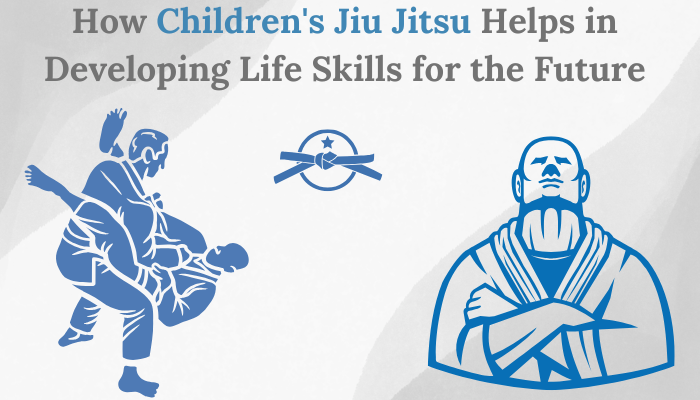When it comes to equipping children with tools for success, few activities offer as much as children’s jiu jitsu. While many think of martial arts solely as a means of self-defense or physical fitness, this dynamic practice goes far beyond the mats. Jiu jitsu for kids instills discipline, confidence, focus, and resilience—life skills that are invaluable in shaping future leaders, problem-solvers, and community-minded individuals.
In this article, we’ll dive into how children’s jiu jitsu can help your child develop the life skills necessary to thrive in today’s ever-changing world.
What Is Children’s Jiu Jitsu?
Children’s jiu jitsu is a grappling-based martial art tailored specifically for kids. Unlike traditional striking martial arts, it emphasizes technique, leverage, and strategy over brute strength. It teaches children how to gain control in various situations, using methods like joint locks, pins, and positional holds.
What sets children’s jiu jitsu apart is its practicality—it encourages kids to use their minds and bodies harmoniously while fostering self-confidence and emotional regulation.
The Core Principles of Children’s Jiu Jitsu
Before delving into the life skills jiu jitsu fosters, let’s explore its fundamental principles-
- Respect- Bowing to instructors and peers cultivates a sense of humility and mutual regard.
- Perseverance- Students learn that progress requires consistent effort and practice.
- Self-Control- Emotional and physical regulation is central to jiu jitsu techniques.
- Adaptability- Success on the mat depends on thinking critically and responding dynamically.
These principles create a foundation for kids to develop character traits that benefit them beyond the dojo.
How Children’s Jiu Jitsu Builds Confidence
Confidence is one of the first life skills children develop through jiu jitsu. By mastering new techniques, successfully escaping holds, or earning their next belt, kids see tangible evidence of their growth.
When children face challenges, such as grappling against larger opponents, they learn that success comes from using intelligence and persistence rather than sheer force. This fosters a sense of capability that extends to school, friendships, and future endeavors.
For instance, a child who overcomes the fear of stepping onto the mat for the first time will later have the courage to step into a classroom, sports team, or workplace with confidence.
Discipline and Focus: Foundations for Success
In the modern world, distractions abound. Many parents worry about their children’s ability to focus amid the constant lure of screens and social media. Children’s jiu jitsu counters this by teaching discipline and concentration.
Each session requires kids to pay attention to their instructor’s guidance, remember sequences, and practice techniques repeatedly. This discipline translates to better study habits and task completion in academic and personal settings.
Moreover, jiu jitsu encourages mindfulness. Kids learn to be present in the moment, staying attuned to their movements and their opponent’s actions. This awareness sharpens their ability to focus on goals and manage time effectively.
Resilience: Bouncing Back from Failure
Failure is inevitable in life, but resilience is what determines how one responds to it. Children’s jiu jitsu instills this critical skill by providing a safe space for kids to face setbacks.
Whether it’s being pinned during sparring or struggling to execute a new move, kids learn to view challenges as opportunities for improvement rather than reasons to quit. Over time, this mindset helps them develop a “never-give-up” attitude that serves them well in sports, academics, and relationships.
For example, a child who endures difficult sparring sessions without giving up builds the resilience needed to face exams, public speaking, or other high-pressure situations with determination.
Social kills
Although jiu jitsu is often seen as an individual sport, its practice fosters collaboration and social interaction. Kids train with partners, which requires communication, trust, and mutual respect. They also support each other during drills, creating a sense of camaraderie and teamwork.
In addition, interacting with children of different ages, backgrounds, and skill levels teaches empathy and adaptability. These skills are critical for building strong relationships throughout life, whether in personal or professional settings.
Problem-Solving and Critical Thinking
Jiu jitsu is often referred to as “human chess” because it requires strategic thinking. Kids must analyze their opponent’s movements, anticipate their next steps, and adapt accordingly.
For example, escaping a difficult position requires not only physical effort but also careful consideration of angles, timing, and leverage. By engaging in this kind of mental problem-solving regularly, children develop critical thinking skills that help them approach challenges in creative and effective ways.
These problem-solving abilities extend to the classroom and beyond, enabling kids to tackle math problems, resolve conflicts, and navigate complex situations with confidence.
Emotional Regulation Through Children’s Jiu Jitsu
Emotions like frustration, fear, and anger are part of life. Children’s jiu jitsu teaches kids how to manage these emotions constructively.
During training, kids may feel frustrated when they can’t master a technique or lose a sparring match. Instructors guide them to channel these feelings into motivation rather than defeat. This helps children build emotional intelligence and maintain composure under pressure.
For instance, a child who learns to stay calm during a match is better equipped to handle stressful situations like exams, competitions, or conflicts with peers.
The Physical Benefits of Jiu Jitsu for Kids
While the primary focus of this article is life skills, the physical benefits of kids brazilian jiu jitsu cannot be overlooked. The practice improves flexibility, strength, coordination, and endurance.
Regular physical activity also contributes to mental well-being. Studies have shown that exercise reduces anxiety, improves mood, and boosts overall cognitive function—benefits that enhance a child’s ability to focus and succeed in other areas of life.
Children’s Jiu Jitsu as a Pathway to Leadership
Leadership is another key life skill that emerges from practicing children’s jiu jitsu. As kids progress in their training, they often take on mentoring roles, helping newer students learn the ropes.
This experience teaches them responsibility, patience, and the ability to guide others—qualities that are crucial for effective leadership.
Additionally, earning higher belts symbolizes hard work, perseverance, and achievement, all of which inspire confidence and the respect of peers.
Parents’ Role in Supporting Jiu Jitsu Training
While the benefits of children’s jiu jitsu are extensive, parental support is essential for maximizing its impact. Encouraging attendance, celebrating progress, and discussing lessons learned on the mat help children internalize the values they gain from training.
Moreover, parents who actively engage with their child’s jiu jitsu journey—by attending competitions, asking about techniques, or even trying classes themselves—strengthen the bond and reinforce the life skills being taught.
The Future Is Bright with Children’s Jiu Jitsu
The life skills children gain from jiu jitsu are far-reaching. Confidence, discipline, resilience, and emotional intelligence provide a strong foundation for future success in academics, relationships, and careers.
By enrolling your child in children’s jiu jitsu, you’re not just giving them an extracurricular activity—you’re investing in their growth as capable, well-rounded individuals.
If you read more Blog explore this website also- https://guestpostsubmission.com/








